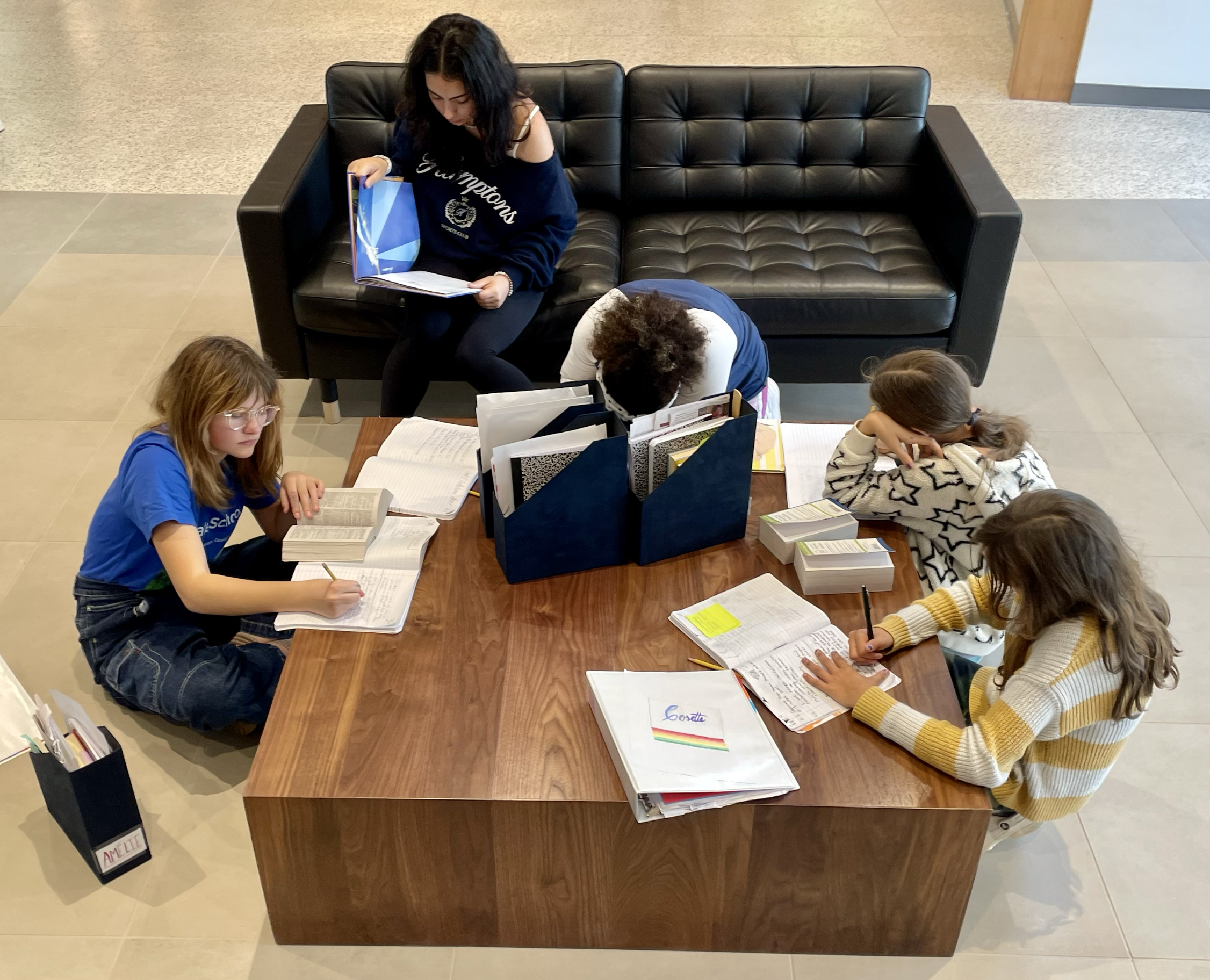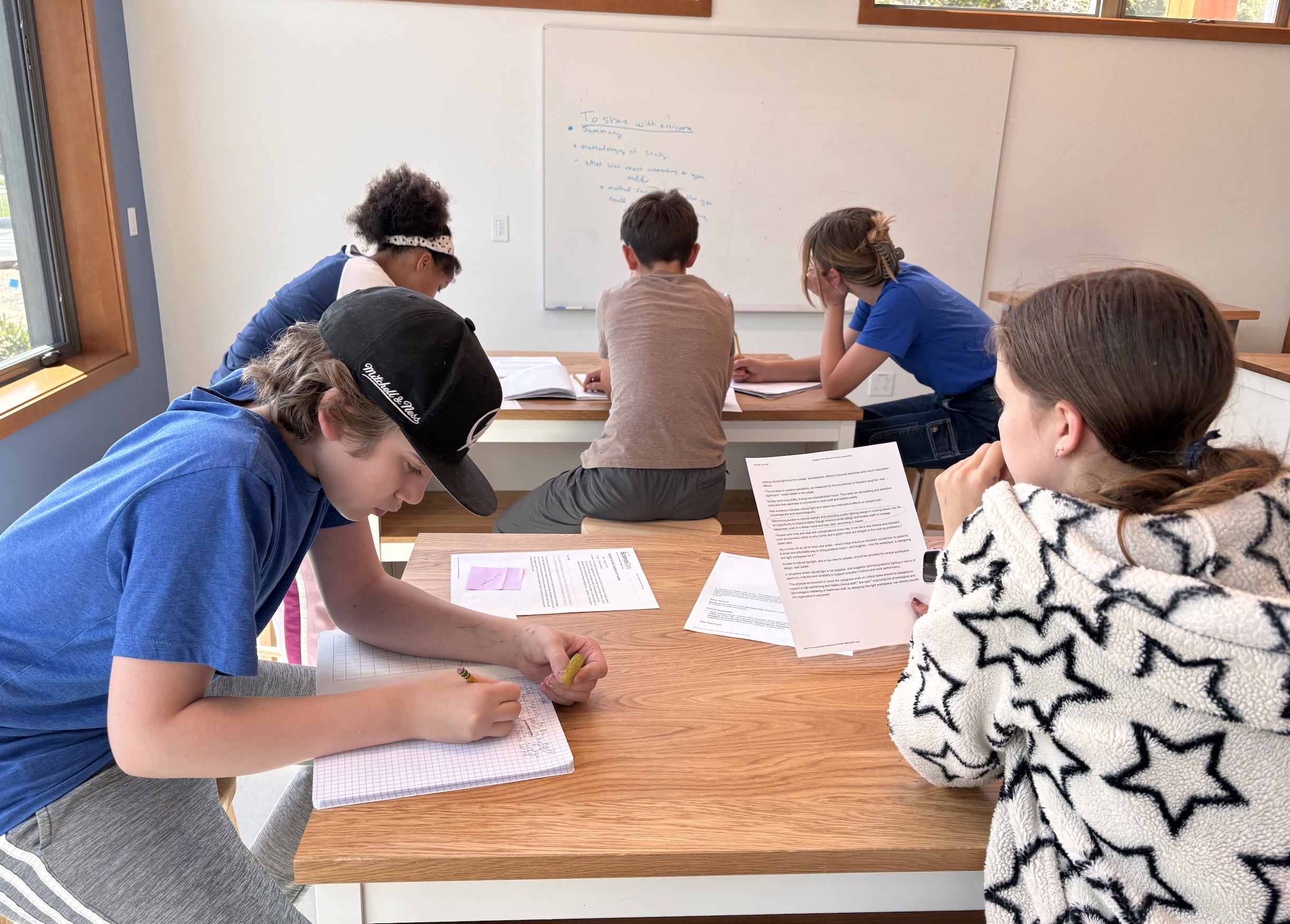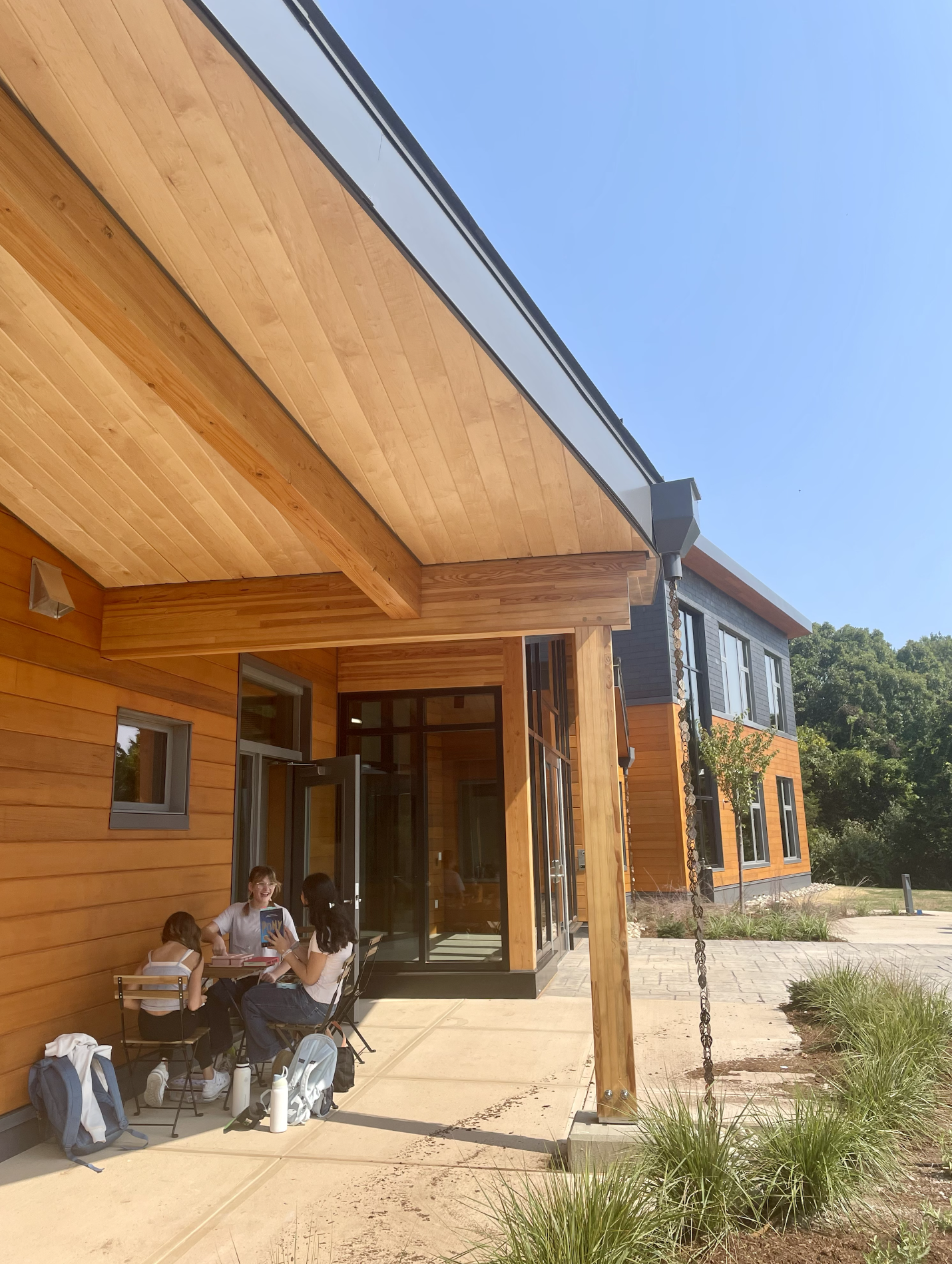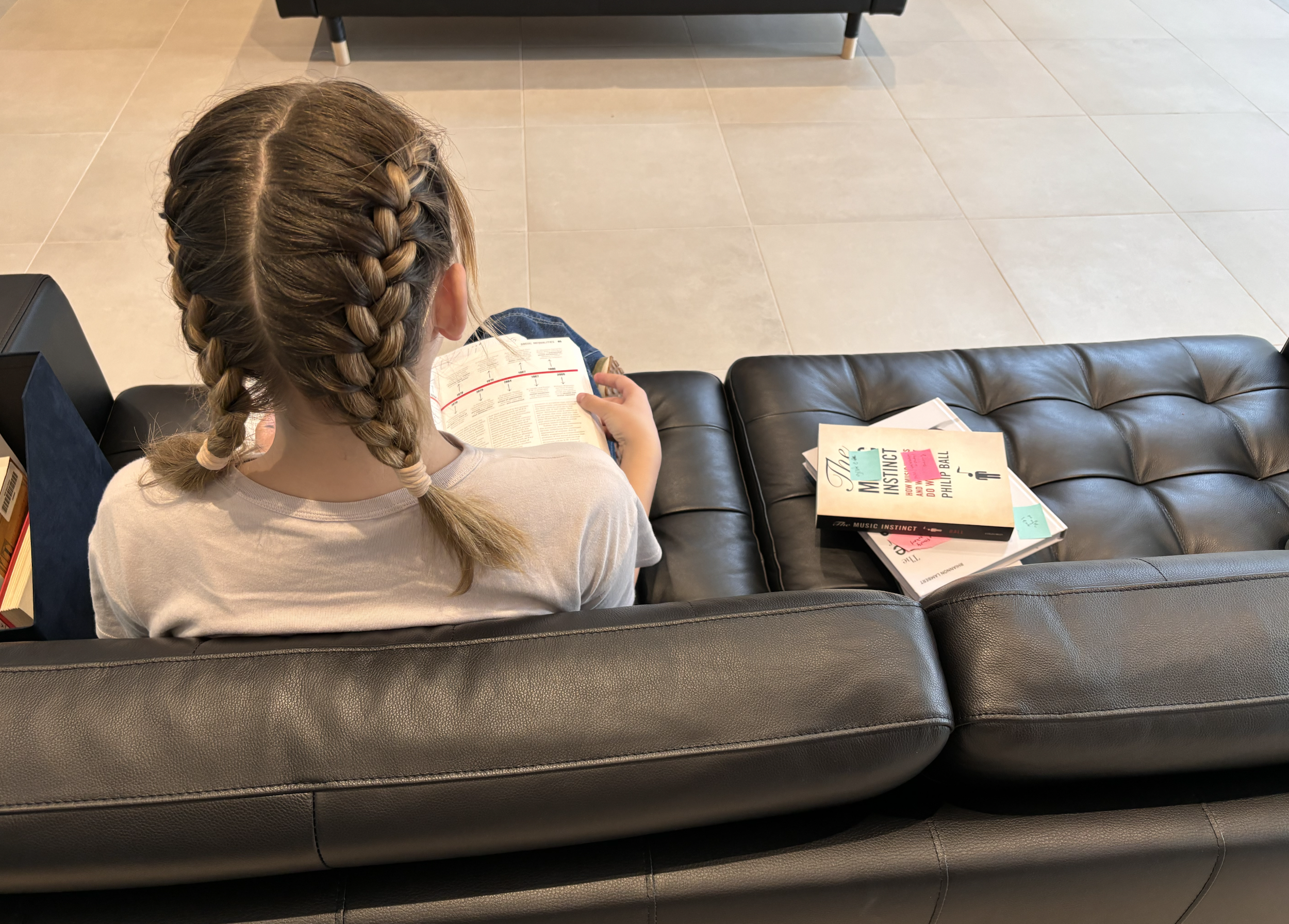
The Upper School’s Unique Curriculum
Reimagining Grades 7-12
At Slate School, we reimagine the Upper Grades. Slate Upper School has 15 students per grade, beginning with Grade 7 in Fall 2024, and growing to a total of 90 students in grades 7-12 in Fall 2029. When we have a full cohort of K-12 students, we will have 160 total students in the school.
Our students explore widely, dive deeply, research, investigate, and collaborate. Their journey is guided by faculty and advisors who are creative thinkers who transcend typical rote approaches to teaching. While attentive to benchmarks and a robust established curriculum, faculty are flexible to allow course direction to be learner-centered and therefore driven by the students’ own work and ideas. All students also put learning into action by engaging daily in their original research project. The project selection is completed in trimester approaches, with the possibility of multiple trimesters to be stringed together into a year-long project, if desired.
“Knowing how to nurture and guide students’ curiosity is the gift of all great teachers. They do that by encouraging students to investigate and inquire for themselves, by posing questions rather than only giving answers, and by challenging them to push their thinking deeper by looking further.”
— Sir Ken Robinson
Empowered Learning
We are inspired by education thought leaders Sir Ken Robinson, Tony Wagner, Ted Dintersmith, and Wendy Ostroff, among others. We envision a world where education focuses on curiosity, creativity, critical thinking, communication, collaboration, compassion, and citizenship. As opposed to siloed subjects of learning, Slate Lower and Upper Schools integrate the disciplines together, and the spaces in both schools are designed to support these unique educational philosophies. Students engage in deliberate practice to build and demonstrate their skills and knowledge, while developing a portfolio demonstrating the breadth and depth of their learning, competency, and expertise. Students are prepared to thrive in college and beyond.

Grade 7-8 Scope of the Day
In Grades 7 and 8 at Slate School, students grow their autonomy, skills, and learning. With a focus on building competency in autonomy, students take ownership of their learning, seek to challenge themselves, and are guided by faculty advisors who support each student to develop skills towards work habits and interpersonal skills.
Throughout the day, students have opportunities to work independently, in small groups, and in whole-class Studios. Slate School supports each student to wonder, engage, deeply learn, and flourish in a learner-centered and academically-rigorous environment. We assess our students robustly and authentically, focusing on curricular benchmarks and essential competencies rather than relying on a traditional grading scale that can be arbitrary. Students reflect on and thoughtfully produce examples of their learning, and they develop portfolios of meaningful work.
Each day begins with students participating in Suggested Practice. This time may involve critically reading and summarizing newspaper articles, preparing for the day’s work, Spanish language acquisition, or attending one-on-one advisory meetings. After this period, students gather for a morning meeting to kick off the day and review key skills from the previous day.
In the middle grades at Slate School, students participate in a Studio Model that emphasizes a project-based, interdisciplinary approach with real-world connections in a collaborative setting. Each day includes a morning and an afternoon session dedicated to Studio Launches. These Launches are designed by educators to be interdisciplinary and are tailored to meet competency goals and student interests. During these sessions, learners and educators set goals for dedicated research time, followed by opportunities to share their findings. Reflection occurs throughout this process, allowing knowledge and core skills to grow continuously and organically. Studio work often includes deliberate practice to develop skills, enabling students to access increasingly complex understandings across the curriculum.
In addition to the Studio Launches, which engage the entire class, students benefit from two daily extended periods dedicated to Deliberate Practice. During these sessions, students focus on personalized skill building with guidance from educators. For example, these activities include daily reading, writing, and editing, as well as small-group sessions of interdisciplinary approaches to Integrated Math. Students also dedicate time to their independent projects. We seamlessly integrate English, History, Math, and Science, ensuring that content and skills are always interconnected and not learned in isolation.
Grade 7-8 Curricular Overview
Slate School's curriculum is thoroughly researched and expertly designed to deeply engage and challenge students in all disciplines. We do not use traditional textbooks, which often provide only superficial and rote understanding about topics. Instead, we use a diverse range of curated resources, including national newspapers, articles from leading journals, books, documentaries, primary sources, insights from experts, and experiences.
Our students engage in learning through collaborative and independent projects that are highly relevant to both them and their communities. In our Studio Model, we start by exploring a topic or problem that requires deeper understanding. First, we work as a whole group to clarify our purpose by reading articles and conducting research. Next, we divide into smaller collaborative groups to further investigate specific aspects of the topic, frequently sharing our findings as we create a document that reflects our new understanding. This process not only helps us learn about various issues but also encourages us to develop ideas to address global challenges. For example, in a recent Studio focused on Happiness, students explored methods for understanding happiness, the history of emotional well-being, and biases that can hinder true happiness. They then applied their insights to deepen their understanding of Slate School’s core values: Friends, For Others, Forgiveness, and Gratitude. A recent Grade 7 launch delved into our election cycle, examining local, national, and international issues. This launch culminated with a field trip to the Quinnipiac Polling Institute on Election Day 2024. During Winter 2025, students engaged in a launch about migrations of humans as well as animals. Each of the Studios integrate all disciplines, including historical perspectives and social sciences.
Literacy is at the heart of much of what our students do and learn. Our students each have personal books of their choice that they read and contemplate, while also reading a book that the entire class explores together. Both types of texts provide opportunities for building greater understanding of author’s craft, thematic development, story grammar, and most of all, understanding differing perspectives. Students also routinely write about their reading and have opportunities to apply the craft that they encounter in these model texts.
At Slate Upper School, we’ve adopted the Integrated Math approach as the foundation of our mathematics instruction. Rather than isolating algebra and geometry, Integrated Math merges all areas of math, reflecting how these subjects coexist in the real world. Our unique approach is interdisciplinary, interactive, experiential, and relevant, with new concepts often introduced alongside their historical context and applications. For example, students engage with algebraic equations and graphing when dropping balls in free fall to calculate the acceleration of gravity. They also create saline solutions that match the world's bodies of water, and through that exploration, they explore percentage concentrations, buoyancy, and other related concepts. This hands-on, small-group learning allows them to apply mathematical ideas to authentic situations. Read about recent Grade 7 mathematical experiences: “Interdisciplinary Exploration of Patterns and the Golden Ratio” and “From Ramps to Renaissance Art: The Power of Slope”.
Similarly, our Science instruction is interdisciplinary and experiential, often integrated with math, history, social sciences, and the arts. Reading and writing skills are also essential components of our science curriculum. Students frequently read, write about, and discuss published science journal articles, which engages them in cutting-edge knowledge while learning about the scientific method, data analysis, and scientific writing. Experiments and laboratory work are also key parts of their learning experience. Read about a recent Grade 7 experience at the intersections of math and science, “Exploring the Gravity Discoveries of Galileo, Newton, and Cavendish”. We also have a blog about a recent trimester of the 8th grade Think Lab course: “From Factfulness to October Sky: Interdisciplinary Learning From Data, Texts, and Historic Perspectives.”

Advising
Students identify and apply competencies from our curriculum to establish weekly goals for growth and mastery in consultation with their advisors. Advisors meet with individual advisees for coaching twice per week. Each session begins with the student’s reflection on progress and challenges, which leads to wise goal setting and refinement of the goals in progress. The week’s goals also include areas where students are working to grow their autonomy. Students receive direct instruction in Time Management, Goal Management, Initiative, Self Knowledge, Collaboration, and Communication as they build these skills for successful life-long learning.
Grade 9-12 Courses at the Intersections
In the Upper Grades, we continue to find connections across disciplines. Our courses include Salt, Ethics and Policy, Theatre of the World, Equality, Food, Thought, among many other innovative and intriguing courses. Each course is honors level and interdisciplinary, and students learn all of the disciplines (algebra, chemistry, biology, physics, literature, composition, history, and so on) through the unique and interesting non-siloed course lens.
Each of our non-siloed courses is designed around benchmarks for in-depth study, with students learning through reading, writing, discussion, collaboration, problem solving, and projects. Course titles include Thought, Food, Reflection, Methods of Study within Scholar Projects, Water, Complexity and Unintended Consequences, Theatre of the World, Equality, Salt, Sugar, Print, Journeys, Design and Engineering, Ethics and Policy, The Body Puzzle, Frontiers and Borders, Light and Sound, among many others.
Through these interdisciplinary courses, Slate School students are enlivened and challenged. They far exceed the typical expectations of high school through the authentic, applicable, and multidisciplinary understandings. Each course culminates with a project that identifies problems and develops ideas for solutions. Our students are “solutionaries;” They apply their learning to create real solutions to real issues.
In addition to their courses, each student designs and pursues independent projects and research studies. Many of these students pursue their projects in the Idea Lab space of the Upper School.
Several Grade 9-12 Course Descriptions
Water: Water is the resource that runs the world. There is nothing more essential, and few things more complex. Our work will grow from an explicit understanding of the science of water, the mathematics of its scarcity and abundance, and how it has influenced and been influenced by the development of human civilizations.
Journeys: Experience important stories shared across time to explore their relevance to our lives today. Tales of immigration, conflict, injustice, heroism, and innovation, travel through books, oral history, art, music, and primary sources to help us understand where we come from and where we're going.
Salt: Salt is essential and omnipresent. NaCl’s crystals are translucent, its uses are myriad, and its availability has been critical to civilization. Salt holds an important place in religious rituals worldwide. Explore salt chemistry to understand the commonalities and differences between the widely-known and edible table salt (NaCl) and the myriad of other inorganic salts.
Sugar: Explore sugar from discovery to current day. How has sugar’s reputation through history evolved, and what power dynamics have been involved? Explore sugar production, the chemistry of sugar, and the processing of sugars by the body.
The Body Puzzle: The body is an interconnected and interdependent web of complex systems. The historical and philosophical explorations of the human body offer an understanding for all of the science that we've learned from and about the body, and all that remains unknown and unanswered. How do we critically think about the body's systems, while maintaining humility in not knowing everything about how the body works?
Complexity and Unintended Consequences: The problems of our world are complex and interconnected. How do we respond to these challenges with the greatest foresight? Where does the balance lie between quick and decisive action and steady and contemplative response? Apply models of problem solving from the diversity of thought around the globe to find your personal answers to these questions.
Thought: The brain's storage capacity is considered virtually unlimited, so it should not be surprising that it is the source of great innovation, spectacular failure, immense creativity, and madness. Dig into this most complex topic to consider the ideas of history's greatest minds and the remarkable science of this unique organ.
Food: Join in the contemplation of a topic that brings biology, anthropology, chemistry, economics, evolution, physics, agriculture, politics, and religion to the table.

Moving Beyond APs
The movement for high schools to provide AP courses began in the 1950s. Today, there is a growing trend away from AP courses in schools. Educators and learners alike have recognized that these courses offer much less than they promise. Longstanding institutions such as Choate, Andover, Exeter, Milton Academy, Sidwell Friends, Riverdale, among many others, have abandoned AP offerings. They cite a significant preference to have their faculty lead the direction for each course, as opposed to teaching a boxed curriculum with the sole learning achievement watered down to a score on a multiple choice test. Colleges no longer seek numbers of AP courses taken or AP scores, but rather universities are seeking students with intellectual curiosity and rigor that goes well beyond preparation for a multiple choice test.
All of Slate School’s courses offer opportunities for advanced learning. The typical Slate School class is modeled on the way we access and use knowledge in the real world. All classes are interdisciplinary, allowing students to engage fluently and fluidly in important skills of writing, effective communication, problem solving, collaboration, flexibility, critical thought, and scientific inquiry.
What Others Are Saying
Slate School is a unique innovator. We draw inspiration from other schools and thinkers in the country. Here's what some of them say about this kind of learning:
“We are deeply invested in the entirety of students and believe they are more than just receptacles to be filled with knowledge and skills.”—Embark Education, Denver
“We believe when young people can see relevance in their education, build connections to opportunity through their studies, and genuinely care for one another, they are equipped to be a force for good—for themselves, their community, and the world.”—GCE Lab School, Chicago
“College admissions officers have gone out of their way to tell us how much they value NuVu’s curriculum and learning model. They understand that our students are well ahead of their peers with regard to critical thinking, creative confidence, collaborative skills, technical experience and capacity to grapple with complex, real-world issues.”—NuVu Innovation School
“Ours is not a desk and chalkboard institution but rather a center, a laboratory, where students develop ideas and understanding, pursue passions and dreams."—Bennett Day School, Chicago
"Students engage in work that matters to them, to their teachers, and to the world outside of school. Students connect their studies to the world through fieldwork, community service, internships, and consultation with outside experts. Our facilities are collaborative workplaces with small-group learning and project areas, relevant technology, and common spaces where artwork, prototypes, and other artifacts of student thinking are created and displayed.”—High Tech High, California
